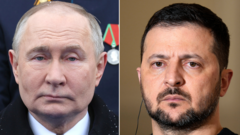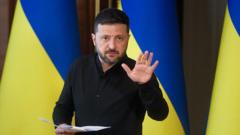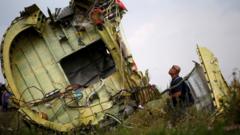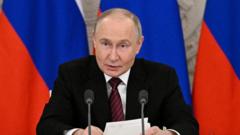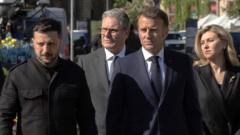In an evolving political landscape marked by internal strife, Kyiv Mayor Vitali Klitschko publicly criticized President Volodymyr Zelensky for what he perceives as an overreach of authority during martial law. This confrontation signals a deepening rift between the two leaders, intensifying as Ukraine approaches potential elections.
Kyiv Mayor Engages in Ongoing Conflict with Zelensky Over Martial Law Authority

Kyiv Mayor Engages in Ongoing Conflict with Zelensky Over Martial Law Authority
Tensions escalate in Ukraine as Kyiv's mayor publicly challenges the president over the handling of martial law amid ongoing conflict.
In a video statement made earlier this week, Klitschko, a former boxing champion turned political figure, accused the Zelensky administration of exploiting martial law to undermine local governance. He specifically targeted the recent appointment of a military administrator, Tymur Tkachenko, claiming it disregards the democratic processes meant to empower the capital’s elected officials.
Klitschko's grievances stem from long-standing tensions with Zelensky, which have escalated amidst the backdrop of nearly three years of war with Russia. His recent statements allege that Tkachenko lacks the necessary military experience for the role, suggesting ulterior motives behind the appointment that pose a threat to the city's economic activities.
According to Klitschko, Tkachenko’s administration has resulted in unnecessary delays affecting infrastructure and construction projects that are vital for Kiev's growth, which he argues could be detrimental as they seek a path towards stability and potential peace talks.
The discord over martial law authority reflects deeper issues within Ukraine’s political climate as leaders grapple with military governance versus elected representation during a time of national crisis.
As Kyiv braces for the possibility of elections in a future cease-fire scenario, the widening divide between Klitschko and Zelensky raises questions about governance, political power dynamics, and the role of democratic institutions under martial rule.
Klitschko's grievances stem from long-standing tensions with Zelensky, which have escalated amidst the backdrop of nearly three years of war with Russia. His recent statements allege that Tkachenko lacks the necessary military experience for the role, suggesting ulterior motives behind the appointment that pose a threat to the city's economic activities.
According to Klitschko, Tkachenko’s administration has resulted in unnecessary delays affecting infrastructure and construction projects that are vital for Kiev's growth, which he argues could be detrimental as they seek a path towards stability and potential peace talks.
The discord over martial law authority reflects deeper issues within Ukraine’s political climate as leaders grapple with military governance versus elected representation during a time of national crisis.
As Kyiv braces for the possibility of elections in a future cease-fire scenario, the widening divide between Klitschko and Zelensky raises questions about governance, political power dynamics, and the role of democratic institutions under martial rule.

